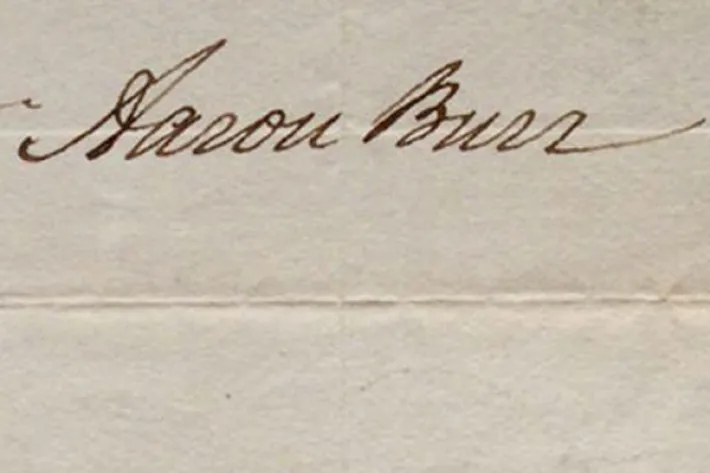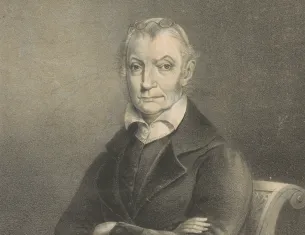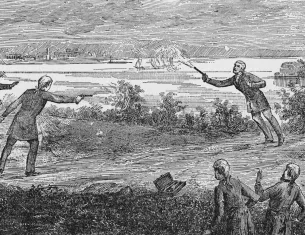Aaron Burr Challenges Alexander Hamilton, 1804

Aaron Burr's signature from a promissory note, 1786. (The Gilder Lehrman Institute of American History)
Several letters between Aaron Burr and Alexander Hamilton preceded the Hamilton-Burr duel. In late June 1804, just a few weeks before their July 11 duel, the correspondence between Aaron Burr and Alexander Hamilton grew increasingly heated, while remaining formal. On June 20, Hamilton had written, “I have become convinced, that I could not, without manifest impropriety, make the avowal or disavowal which you seem to think necessary.”
In this letter written on June 22, Burr condemns Hamilton for not retracting negative statements. Hamilton never read this message, as by the time it was delivered, Hamilton had already sent Burr another letter. However, it demonstrates Burr’s state of mind at this stage in the proceedings.
A Letter from Aaron Burr to Alexander Hamilton, June 22, 1804
Nyork June 22d. 1804
Sir
Mr. V Ness has this evening reported to me Verbally that you refuse to answer my last letter, that you consider the course I have taken as intemperate and unnecessary and some other conversation which it is improper that I should notice.
My request to you was in the first instance proposed in a form the most simple in order that you might give to the affair that course to which you might be induced by your temper and your knowledge of facts. I relied with unsuspecting faith that from the frankness of a Soldier and the Candor of a gentleman I might expect an ingenuous declaration; that if, as I had reason to believe, you had used expressions derogatory to my honor, you would have had the Spirit to Maintain or the Magnanimity to retract them, and, that if from your language injurious inferences had been improperly drawn, Sincerity and delicacy would have pointed out to you the propriety of correcting errors which might thus have been widely diffused.
With these impressions, I was greatly disappointed in receiving from you a letter which I could only consider as evasive and which in manner, is not altogether decorus. In one expectation however, I was not wholly deceived, for at the close of your letter I find an intimation, that if I should dislike your refusal to acknowledge or deny the charge, you were ready to meet the consequences. This I deemed a sort of defiance, and I should have been justified if I had chosen to make it the basis of an immediate message: Yet, as you had also said something (though in my opinion unfounded) of the indefiniteness of my request; as I believed that your communication was the offspring, rather of false pride than of reflection, and, as I felt the utmost reluctance to proceed to extremities while any other hope remained, my request was repeated in terms more definite. To this you refuse all reply, reposing, as I am bound to presume on the tender of an alternative insinuated in your letter.
Thus, Sir, you have invited the course I am about to pursue, and now by your silence impose it upon me. If therefore your determinations are final, of which I am not permitted to doubt, Mr. Van Ness is authorised to communicate my further expectations either to yourself or to such friend as you may be pleased to indicate.
I have the honor to be Your Ob st
A. Burr
Source: Aaron Burr to Alexander Hamilton, June 22, 1804, Founders Online, National Archives. Originally from The Papers of Alexander Hamilton, vol. 26, 1 May 1802–23 October 1804, Additional Documents 1774–1799, Addenda and Errata, ed. Harold C. Syrett. New York: Columbia University Press, 1979, pp. 255–256.
A Letter from Aaron Burr to Alexander Hamilton, June 22, 1804
Nyork June 22d. 1804
Sir
Mr. V Ness has this evening reported to me Verbally that you refuse to answer my last letter . . .
I relied with unsuspecting faith that from the frankness of a Soldier and the Candor of a gentleman I might expect an ingenuous declaration; that if, as I had reason to believe, you had used expressions derogatory to my honor, you would have had the Spirit to Maintain or the Magnanimity to retract them . . .
With these impressions, I was greatly disappointed in receiving from you a letter which I could only consider as evasive . . . In one expectation however, I was not wholly deceived, for at the close of your letter I find an intimation, that if I should dislike your refusal to acknowledge or deny the charge, you were ready to meet the consequences. This I deemed a sort of defiance . . . Yet . . . I believed that your communication was the offspring, rather of false pride . . . and, as I felt the utmost reluctance to proceed to extremities while any other hope remained, my request was repeated in terms more definite. To this you refuse all reply . . .
Thus, Sir, you have invited the course I am about to pursue . . . If therefore your determinations are final . . . Mr. Van Ness is authorised to communicate my further expectations . . .
I have the honor to be Your Ob st
A. Burr
Source: Aaron Burr to Alexander Hamilton, June 22, 1804, Founders Online, National Archives. Originally from The Papers of Alexander Hamilton, vol. 26, 1 May 1802–23 October 1804, Additional Documents 1774–1799, Addenda and Errata, ed. Harold C. Syrett. New York: Columbia University Press, 1979, pp. 255–256.
ingenuous - sincere
derogatory - disrespectful
magnanimity - generosity
intimation - hint
reluctance - unwillingness
extremities - limit
Background
Several letters between Aaron Burr and Alexander Hamilton preceded the Hamilton-Burr duel. In late June 1804, just a few weeks before their July 11 duel, the correspondence between Aaron Burr and Alexander Hamilton grew increasingly heated, while remaining formal. On June 20, Hamilton had written, “I have become convinced, that I could not, without manifest impropriety, make the avowal or disavowal which you seem to think necessary.”
In this letter written on June 22, Burr condemns Hamilton for not retracting negative statements. Hamilton never read this message, as by the time it was delivered, Hamilton had already sent Burr another letter. However, it demonstrates Burr’s state of mind at this stage in the proceedings.
Transcript
A Letter from Aaron Burr to Alexander Hamilton, June 22, 1804
Nyork June 22d. 1804
Sir
Mr. V Ness has this evening reported to me Verbally that you refuse to answer my last letter, that you consider the course I have taken as intemperate and unnecessary and some other conversation which it is improper that I should notice.
My request to you was in the first instance proposed in a form the most simple in order that you might give to the affair that course to which you might be induced by your temper and your knowledge of facts. I relied with unsuspecting faith that from the frankness of a Soldier and the Candor of a gentleman I might expect an ingenuous declaration; that if, as I had reason to believe, you had used expressions derogatory to my honor, you would have had the Spirit to Maintain or the Magnanimity to retract them, and, that if from your language injurious inferences had been improperly drawn, Sincerity and delicacy would have pointed out to you the propriety of correcting errors which might thus have been widely diffused.
With these impressions, I was greatly disappointed in receiving from you a letter which I could only consider as evasive and which in manner, is not altogether decorus. In one expectation however, I was not wholly deceived, for at the close of your letter I find an intimation, that if I should dislike your refusal to acknowledge or deny the charge, you were ready to meet the consequences. This I deemed a sort of defiance, and I should have been justified if I had chosen to make it the basis of an immediate message: Yet, as you had also said something (though in my opinion unfounded) of the indefiniteness of my request; as I believed that your communication was the offspring, rather of false pride than of reflection, and, as I felt the utmost reluctance to proceed to extremities while any other hope remained, my request was repeated in terms more definite. To this you refuse all reply, reposing, as I am bound to presume on the tender of an alternative insinuated in your letter.
Thus, Sir, you have invited the course I am about to pursue, and now by your silence impose it upon me. If therefore your determinations are final, of which I am not permitted to doubt, Mr. Van Ness is authorised to communicate my further expectations either to yourself or to such friend as you may be pleased to indicate.
I have the honor to be Your Ob st
A. Burr
Source: Aaron Burr to Alexander Hamilton, June 22, 1804, Founders Online, National Archives. Originally from The Papers of Alexander Hamilton, vol. 26, 1 May 1802–23 October 1804, Additional Documents 1774–1799, Addenda and Errata, ed. Harold C. Syrett. New York: Columbia University Press, 1979, pp. 255–256.
Excerpt
A Letter from Aaron Burr to Alexander Hamilton, June 22, 1804
Nyork June 22d. 1804
Sir
Mr. V Ness has this evening reported to me Verbally that you refuse to answer my last letter . . .
I relied with unsuspecting faith that from the frankness of a Soldier and the Candor of a gentleman I might expect an ingenuous declaration; that if, as I had reason to believe, you had used expressions derogatory to my honor, you would have had the Spirit to Maintain or the Magnanimity to retract them . . .
With these impressions, I was greatly disappointed in receiving from you a letter which I could only consider as evasive . . . In one expectation however, I was not wholly deceived, for at the close of your letter I find an intimation, that if I should dislike your refusal to acknowledge or deny the charge, you were ready to meet the consequences. This I deemed a sort of defiance . . . Yet . . . I believed that your communication was the offspring, rather of false pride . . . and, as I felt the utmost reluctance to proceed to extremities while any other hope remained, my request was repeated in terms more definite. To this you refuse all reply . . .
Thus, Sir, you have invited the course I am about to pursue . . . If therefore your determinations are final . . . Mr. Van Ness is authorised to communicate my further expectations . . .
I have the honor to be Your Ob st
A. Burr
Source: Aaron Burr to Alexander Hamilton, June 22, 1804, Founders Online, National Archives. Originally from The Papers of Alexander Hamilton, vol. 26, 1 May 1802–23 October 1804, Additional Documents 1774–1799, Addenda and Errata, ed. Harold C. Syrett. New York: Columbia University Press, 1979, pp. 255–256.
ingenuous - sincere
derogatory - disrespectful
magnanimity - generosity
intimation - hint
reluctance - unwillingness
extremities - limit

